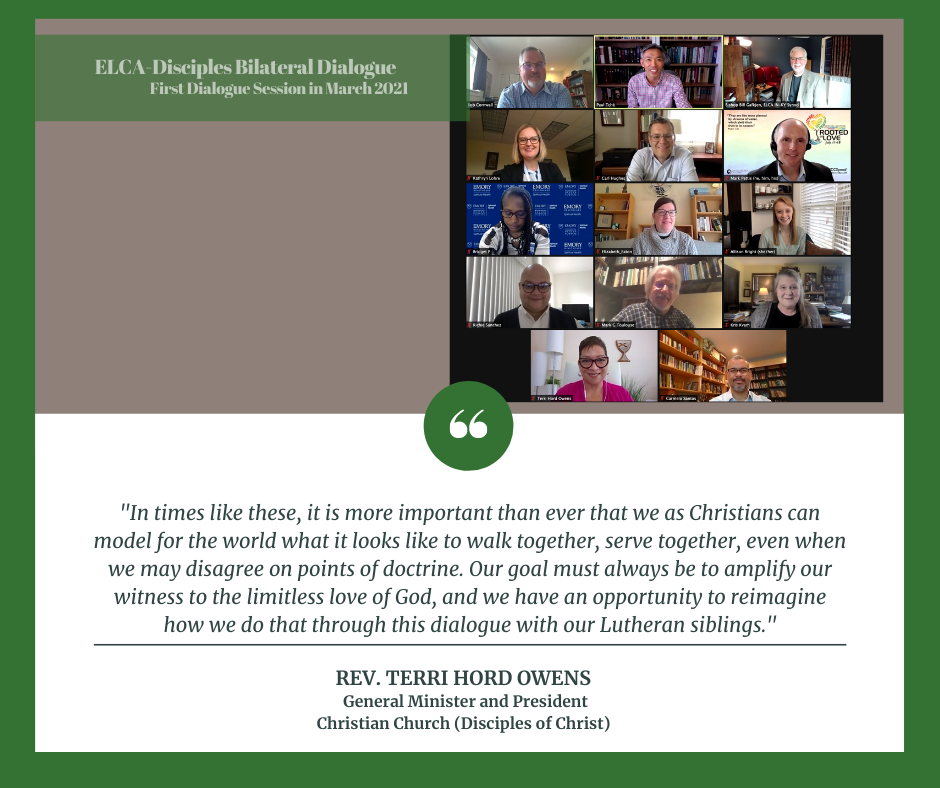
CHICAGO and INDIANAPOLIS — The Evangelical Lutheran Church in America (ELCA) and the Christian Church (Disciples of Christ) have resumed a bilateral dialogue that will define a new ecumenical relationship for common mission and ministry.
In a March 10 meeting, leaders from the two church bodies resumed the dialogue that had begun in 2004 but been put on hold due to leadership and staff changes at both churches.
The goal of the dialogue is to determine what form of ecumenical relationship will enable the two church bodies to affirm their common confession of the Christian faith and to witness to the good news of Christ together more fully. The two churches will explore how they have grown in mutual understanding and common mission over time. An important consideration will be the maturity of the full communion relationship each church shares with the United Church of Christ (UCC). For this reason, the UCC was invited to appoint an observer.
“We celebrate the resumption of this dialogue with the Christian Church (Disciples of Christ) as a sign of the visible unity that is already ours in Christ Jesus,” said the Rev. Elizabeth Eaton, ELCA presiding bishop. “This dialogue will intentionally draw from the deep well of shared mission and ministry in local and regional settings, while tending to the complex theological questions that arise between us as churches. In this way, we hope to be open to the work of the Holy Spirit and the possibility of new forms of ecumenical relationship that serve the gospel and enrich the body of Christ.”
“I am grateful that we are now moving forward in our dialogue with the ELCA,” said the Rev. Teresa Hord Owens, general minister and president of the Christian Church (Disciples of Christ) in the United States and Canada. “In times like these, it is more important than ever that we as Christians can model for the world what it looks like to walk together, serve together, even when we may disagree on points of doctrine. Our goal must always be to amplify our witness to the limitless love of God, and we have an opportunity to reimagine how we do that through this dialogue with our Lutheran siblings.”
This first round of meetings focused on building relationships, identifying the questions participants bring into this dialogue and sharing ideas for next steps.
“The path to Christian unity is hard, but if we can embody the love and grace of God revealed in the life of Jesus, then the journey the ELCA and Disciples have undertaken will be worth the effort,” said the Rev. Dr. Robert D. Cornwall, who serves as dialogue co-chair from the Disciples of Christ. “We may not know where the journey ends, but I am ready and willing to get on the road.”
“The renewal of this dialogue is extremely important right now,” said the Rev. William O. Gafkjen, bishop of the ELCA Indiana-Kentucky Synod and dialogue co-chair from the ELCA.
“In a world that is so deeply divided as we try to deal with profound changes and challenges in our common life, these two different traditions sitting at the table to listen deeply, think creatively, and act boldly together is a much-needed witness to the justice- and peace-seeking spirit of the crucified and risen Christ.”
In the next round of discussions, planned for later this year, the churches will focus on getting to know one another, as traditions and as people. They will make use of case studies developed by each church that highlight examples of common mission and challenges to fuller cooperation and ministry, along with papers from the initial round of dialogue in 2004.
The two churches agree that seeking unity is not the goal of this dialogue, because that has already been accomplished in Christ. Rather, they seek to manifest their unity so that “the world may believe” (John 17:21 NRSV) and God’s just peace may be experienced more fully by all people and creation.
More information about the dialogue, including a list of participants, is available at https://www.disciplescuim.org/elca-disciples-bilateral-dialogue/.